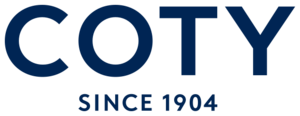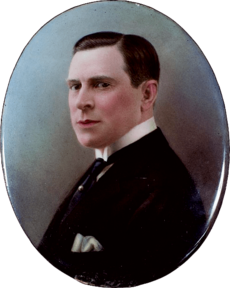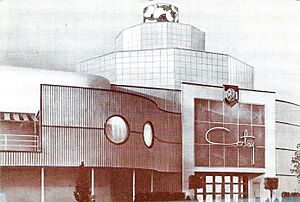Coty facts for kids
 |
|
| Public | |
| Traded as |
|
| ISIN | [https://isin.toolforge.org/?language=en&isin=US2220702037 US2220702037] |
| Industry | Beauty |
| Founded | 1904 in Paris, France |
| Founder | François Coty |
| Headquarters | Empire State Building, New York City, U.S. |
|
Area served
|
Worldwide |
|
Key people
|
|
| Products | |
| Brands |
|
| Revenue | |
|
Operating income
|
|
| Total assets | |
| Total equity | |
|
Number of employees
|
11,791 (2024) |
Coty Inc. is a big American beauty company. It was started in 1904 by François Coty. Coty and its smaller companies create, make, sell, and deliver many beauty products. These include perfumes, cosmetics, skin care, nail care, and hair care items. As of 2024, Coty owns about 40 different beauty brands.
Contents
About Coty: A Global Beauty Company
Coty is one of the largest beauty companies in the world. It is also the biggest company for perfumes. In 2022, Coty made $5.3 billion in sales. In 2016, Coty bought 41 beauty brands from another big company called Procter & Gamble. This made Coty the top company for perfumes globally. It also became the second largest for hair color and styling products. Plus, it was the third largest for color cosmetics.
How Coty Works: Different Beauty Divisions
Coty has three main parts, called divisions:
- Consumer Beauty: This part focuses on everyday products. It includes body care, color cosmetics, perfumes, and hair coloring and styling products.
- Luxury: This division handles fancy, high-end makeup, perfumes, and skin care items.
- Professional Beauty: This part serves people who work in beauty salons and nail salons.
Coty's main goal is to "celebrate and free the many different kinds of beauty."
Coty's Team and Locations
In mid-2018, Coty had about 20,000 full-time employees. These employees worked in 46 different countries. Coty's main offices are in London. However, its Consumer Beauty division is in New York City. The Luxury division is in Paris, and Professional Beauty is in Geneva. Peter Harf is the chairman of Coty. Sue Youcef Nabi became the company's chief executive officer (CEO) in September 2020.
JAB Holding Company is the biggest owner of Coty. As of September 2024, JAB Group owns about 52% of Coty's shares.
Coty's Brands and Products
Coty owns around 40 brands as of 2024. It also works with many other well-known brands. Here are some of them:
- Adidas
- Bourjois
- Beyoncé
- Bruno Banani
- Burberry
- Calvin Klein
- Chloé
- David Beckham
- Davidoff
- Dolce & Gabbana
- Escada
- Gabriela Sabatini
- Gucci
- Hugo Boss
- James Bond (007 James Bond)
- Jil Sander
- JOOP!
- Jōvan Musk
- Katy Perry
- Kylie Cosmetics (51%)
- KKW Beauty (20%)
- Lancaster
- Marc Jacobs
- Marni
- Max Factor
- Mexx
- Miu Miu
- Monange
- Nautica
- Orveda
- philosophy
- Rimmel
- Roberto Cavalli
- Sally Hansen
- Skkn By Kim
- Tiffany & Co
- Vera Wang
- Wella
Coty brought back the CoverGirl and Clairol brands in late 2017 and early 2018. This included the Nice 'n Easy hair coloring product. These relaunches focused on new messages and products that celebrated diversity. The company also relaunched Max Factor in 2018.
Coty's Journey Through Time
Early Years: 1900s–1920s

François Coty started Coty in Paris in 1904. The company's first perfume, La Rose Jacqueminot, came out that same year. Its bottle was designed by Baccarat. Another perfume, L'Origan, was launched in 1905. This perfume became very popular in Paris. It was one of the first nice but affordable perfumes for everyone.
After its first successes, Coty opened its first store in Paris in 1908. Soon after, Coty worked with French glass designer René Lalique. They created special perfume bottles and labels. This started a new trend in how perfumes were packaged for many people. In the early 1910s, Coty also built a "Perfume City" near Paris. This site handled office work and perfume making. It was one of the first businesses to support women employees. It even offered benefits like child care.
Coty started to grow around the world in the early 1910s. First, it expanded to London and New York. Coty set up its U.S. main office at 714 Fifth Avenue in New York City. Lalique designed special glass panels for the building's windows, which were put in place in 1912. Coty stayed in this building until 1941. The building later became a landmark in the 1980s because of its unique windows.
Coty began selling other beauty products like face and body powders in the 1910s. In 1917, it launched one of its most famous perfumes, Chypre. Coty's products became more popular in the United States. This happened as soldiers returned from France after World War I with gifts for their families. In the 1920s, Coty launched over fifteen new perfumes. It also expanded into Germany, Italy, Spain, and Switzerland. Coty, Inc. was officially formed in New York in 1922. It became a public company in 1925, meaning people could buy shares in it.
Mid-Century Growth: 1930s–1990s
François Coty passed away in 1934. His family continued to control the company and served on its board until the 1960s.
Coty's Air Spun face powder was launched in 1935. This powder is still sold today and has not changed much.
In the 1940s, Coty became a big supporter of the growing American fashion industry. It started the Coty American Fashion Critics' Awards. These awards recognized and helped new American fashion designers. Coty stopped being part of these awards in 1985.
Coty became important in the American lipstick market when it launched Coty 24 in 1955. By the 1960s, Coty was a top company for making and selling perfumes. It was the largest perfume company in the U.S. Another company, Pfizer, bought Coty in 1963.
In 1991, Coty had sales of about $280 million. Pfizer sold Coty to Joh. A. Benckiser (now called JAB Holding Company) in 1992. Coty fit well with Benckiser, which had another beauty company. Benckiser also had a way to sell Coty's products around the world. At that time, Coty's perfumes included Emeraude, Exclamation, and Wild Musk. Peter Harf, who was the head of JAB, became Coty's CEO in 1993. In 1996, Coty bought Unilever's European makeup brands, including Rimmel.
New Millennium: 2000s
In the mid-2000s, Coty focused on selling perfumes that famous people supported. These included perfumes for David Beckham, Céline Dion, Jennifer Lopez, and Sarah Jessica Parker. Coty also added more fancy perfumes to its collection. It bought the right to make perfumes for fashion designer Marc Jacobs in 2003. Coty's sales grew from $1.9 billion to $2.1 billion between 2004 and 2005.
In 2005, Coty bought more licenses (rights to make products) from Unilever. These included licenses for Calvin Klein, Cerruti, Chloé, and Vera Wang. These new purchases, along with existing ones like Adidas and Davidoff, made Coty the biggest perfume maker in the world.
Coty bought DLI Holding Corp. in 2007. This added the Sally Hansen and NYC New York Color brands to Coty's collection. The company also made agreements with Balenciaga in 2008 and Bottega Veneta in 2009 to make their perfumes.
Recent Years: 2010s
In 2010, Coty bought OPI Products, a company that makes nail polish. It also bought the skin care brand philosophy. The company also made an agreement with Miu Miu, which is part of Prada.
Coty decided to become a public company in June 2012. It raised about $1 billion when it first offered its shares to the public (IPO) a year later. This IPO in 2013 was one of the largest in the U.S. at the time. Coty bought Bourjois in 2014.
Between 2015 and 2016, Coty bought 41 beauty brands from Procter & Gamble. These brands included Clairol, CoverGirl, Gucci, Hugo Boss, Max Factor, and Wella. This deal made Coty the third largest seller of cosmetics worldwide. Coty also bought a company called Beamly in 2015, which helps with digital marketing.
The company made an agreement with Tiffany & Co. in 2016. Between 2016 and 2017, Coty bought beauty and personal care businesses from Hypermarcas. It also bought ghd and became a major owner in Younique. Younique is a digital beauty company where people sell products to each other. Coty bought 60% of Younique in January 2017. By December, Younique had grown to over 230,000 sellers. However, Coty announced in August 2019 that it was ending its partnership with Younique. It planned to sell its share back to Younique's founders.
Coty bought the rights to Burberry's makeup and perfume brands in April 2017. In July, Coty started selling the skincare brand philosophy on Tmall, a big online shopping site. It also launched other brands there.
In December 2017, a court in Europe decided that Coty was allowed to stop a German seller from selling its products on Amazon. The court said that luxury brands can stop sellers from using third-party websites.
Coty created "Let's Get Ready" for the Amazon Echo Show. This guide came out in early 2018. It shows users different makeup looks and products. Users can then add these products to their online shopping carts. In February, Coty started a special program to help new companies that focus on artificial intelligence.
In November 2019, Coty announced it would buy a $600 million share (51%) in Kylie Cosmetics. This company belongs to famous person and model Kylie Jenner. In June 2020, Coty announced it would buy a 20% share for $200 million in KKW. This company is owned by Kylie Jenner's sister, Kim Kardashian West.
On December 1, 2020, Coty sold its shares in the Wella, Clairol, OPI, and ghd brands to KKR for $2.5 billion. Coty kept a 40% share in these companies. On October 1, 2021, Coty announced it would sell about 9% more of its share in Wella to KKR for $426.5 million. This deal reduced Coty's share in these brands to about 30.6%.
Coty's Commitment to the Environment and Society
Coty and its brands say they care about many social causes. They also try to reduce their impact on the environment. The company has a long-term partnership with Global Citizen. This group works to fight unfair treatment based on gender, sexual orientation, disability, or race. It also promotes people being able to express themselves. Coty has joined other beauty companies to start the Responsible Beauty Initiative. This group encourages businesses to be more sustainable in the beauty industry. Coty has also signed the United Nations Global Compact. This is a UN plan to encourage businesses to have policies that are good for the environment and society.
Coty's Business Rankings
In 2018, Coty was ranked number 371 on the Fortune 500 list. This list shows the largest U.S. companies by how much money they make. Coty was ranked number 5 on Women's Wear Daily's 2017 "Top 100" list of the world's largest beauty makers. Its sales were estimated at $9.15 billion. According to Advertising Age, Coty was one of the biggest advertisers in the world in 2017. In 2018, Coty was ranked number 1,196 on the Forbes Global 2000. This is a list of the top 2,000 public companies worldwide. Also, Coty was ranked number 396 on Forbes's 2018 list of "America's Largest Public Companies."
More to Explore
- Companies listed on the New York Stock Exchange (C)
- List of organizations with official stances on the SOPA and PIPA
 | Madam C. J. Walker |
 | Janet Emerson Bashen |
 | Annie Turnbo Malone |
 | Maggie L. Walker |


